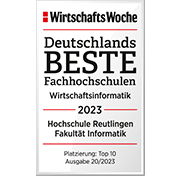

Software Engineering, Entrepreneurship & Innovation
The Software Engineering, Entrepreneurship and Innovation research group focuses on innovative development methods for software-based products and services that generate a high level of customer benefit. Further focal points are the analysis, design and testing of the “Entrepreneurial Process” as well as the identification and validation of technology-oriented/digital innovation ideas and business models (including continuous experimentation, risk prioritization procedures).
Main Research Areas
- Entrepreneurship & Innovation
The development of software-based products today generally takes place in dynamic environments in which technologies and markets are changing rapidly. Requirements for software products cannot usually be defined in advance. Nor is it possible to ask customers what features they would like. In such situations, traditional approaches to software development with upstream requirements definition are not suitable. But how do you still create products that customers want and love? There are new development approaches that combine agile software development methods such as Scrum with processes for brainstorming and validating critical product assumptions. The product manager, who is responsible for the so-called “product backlog”, plays a central role here.
The aim of the research is to develop, analyze and test new techniques and applications of product management. This includes the description of a product vision, the development of a product strategy, the identification and prioritization of critical product assumptions, the data-based testing of critical assumptions with the help of experiments and the further development of the product strategy based on the results of the experiments. Other research topics include startup methods, corporate startups, hypothesis-driven development, scaling lean, customer development, LeanUX, business model validation, and evidence-based service systems engineering.
Data is the gold of the information age. But how do you extract this treasure and use it for the efficient development of successful software? In the context of software development, “analytics” refers to the targeted collection, analysis, interpretation and use of data with the aim of improving the development, maintenance and operation of software and software systems as well as increasing their utility value and market success.
The research aims to develop, analyze, and test fundamental measurement methods and analytics techniques. This includes goal-oriented measurement and analysis methods, as well as developing and applying quality, cost, and benefit models. Other research topics include lean analytics, traction modeling, value modeling, startup metrics, and growth hacking.
- Agile Engineering (Integration of Agile and Traditional Models)
In recent years, more and more agile elements have found their way into professional software development. Methods and process models such as Scrum, Continuous Integration, Continuous Deployment, Kanban and Customer Involvement are used extensively. The advantages of these methods and process models are in particular faster development cycles, faster customer feedback and therefore rapidly accelerated learning cycles.
However, there are still successfully practiced traditional software development processes based on the V-model. In regulated domains such as the automotive industry, mechanical engineering, medical technology, and financial services, extensive and comprehensive safeguards are required. Here, traditional processes have proven effective. For example, in the automotive industry, well-defined V-Model-based development processes are used in drivetrain development. However, agile development processes seem more suitable for quickly creating and at least prototyping new features, such as those based on electric drive technology. The combination of traditional processes and agile practices promises many advantages.
The goal of the research is to analyze and test the suitability of agile methods in regulated domains. In particular, the interaction of traditional and agile approaches will be examined and tested. Other research topics include agile scaling, agile business transformation, organizational change management and agile product lines.
Selected specialist books:
- Jürgen Münch, Ove Armbrust, Martin Soto, Martin Kowalczyk, “Software Process Definition and Management“, Springer Verlag, 2012.
- Victor R. Basili, Adam Trendowitz, Martin Kowalczyk, Carolyn Seaman, Jürgen Münch, Dieter Rombach, “Aligning Organizations Through Measurement – The GQM+Strategies Approach”, Springer Verlag, 2014.
- Jürgen Münch, Klaus Schmid (Eds.), “Perspectives on the Future of Software Engineering“, Springer Verlag, 2013.
- Marco Kuhrmann, Jürgen Münch, Ita Richardson, Andreas Rausch, Jason He Zhang (Eds.). “Managing Software Process Evolution – Traditional, Agile, and Beyond. How to Handle Process Change?”, Springer Verlag, 2016
- Eine Auflistung aller aktuellen Publikationen der Forschungsgruppe findet sich in der Hochschulbibliographie. Die Publikationen von Prof. Dr. Jürgen München auf Google Scholar.
The courses offered by the research group include agile product management, software/lean analytics, startup methods and core software engineering topics such as software architectures and quality modeling. The aim of the lectures is to enable students to develop successful software-based products and services. In addition to software development topics, this also includes the interlinking of software engineering and economic aspects in order to develop valid, scalable and sustainable digital business models.
The research group cooperates with a large number of research institutions and networks in the field of research. In recent years, cooperation with the following organizations and networks has been of particular importance:
Aalto University, Finnland
DASMA, Deutschland
Fraunhofer IESE, Deutschland
Fraunhofer CESE, Maryland, USA
IPA-SEC, Japan
ISERN, Internationales Netzwerk
Mitsubishi Research, Japan
Poznan University of Technology, Polen
University of Bari, Italy
University of Bozen-Bolzano, Italy
University of Helsinki, Finnland
University of Maryland at College Park, USA
University of Maryland Baltimore County, USA
University of Oulu, Finnland
University of Southern Denmark (SDU), Dänemark
University of Tartu, Estland
University Rome Tor Vergata, Italy
SER University of Novi Sad, Serbien
The research group has a large number of cooperation partners in business practice. In the last two years, cooperation with the following companies has been of particular importance:
Bittium
Elektrobit
Daimler AG
Ericsson
Facebook
F-Secure
MySecondWay
Quentinel
Steeri
Tieto
Solita







